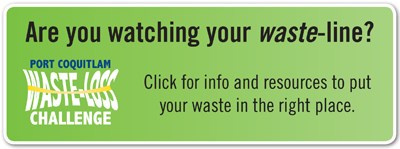And city councillors say they’re ready to start changing policy to fine or even stop picking up trash for anyone not following the new “green” rules.
PoCo councillors sounded the alarm last month after receiving a solid waste audit from Mani Deo, the city’s new manager of operations.
In a two-week study in June of 80 single-family homes and 23 multi-family units that receive city collection, staff uncovered a combined average of 45% of divertible materials chucked in the trash.
Worst of all, one-third of them were organics.
As well, an average of 11% of the items placed in recycling bins weren’t supposed to be there while the so-called “contamination rate” for the organics stream was an average of 2%.
Deo said the city can’t go over the 3% contamination cap for recycling under its contract with Multi-Materials BC (MMBC), a non-profit group responsible for residential recycling programs across the province.
And if it does, PoCo will face fines up to $120,000 a year — nearly a full percentage point on the municipal tax bill — should residents not comply. (Unlike Coquitlam, PoCo has an in-house garbage, recycling and organics collection and, as a hauler, is responsible for contamination).
This past summer, Deo said, MMBC put PoCo on notice and told the city to sort out the mess.
But at least one councillor complained to Deo about the complicated sorting system.
Coun. Mike Forrest said residents want to follow the rules but often find it a confusing process (see sidebar). Deo also admitted he carries a disposal cheat sheet.
Mayor Greg Moore, chairperson of the Metro Vancouver board, said a big part of the recycling problem is that MMBC won’t accept plastic bags in its bins; as a result, they get tossed in the trash, which in turn hurts the municipality’s diversion efforts.
He recommended city council continue to lobby the provincial government to have MMBC allow plastic grocery bags.
As for food scraps and yard trimmings in the regular trash, Deo said PoCo residents can do better given that Metro Vancouver’s organics ban went into effect Jan. 1.
If residents dump all their organics in the green bin, the city would not only reach Metro’s overall diversion target of 80% by 2020 (it’s currently at 63% versus Coquitlam and Port Moody’s 74%) but PoCo would also see lower tipping fees: $71/tonne for organics versus $100/tonne for trash.
To stem the tide, city council said it’s considering tacking on another $2 per household next year to the solid-waste bill. Proceeds would fund yet another public education drive, at a cost of $50,000 (the increase has yet to be ratified).
Still, some councillors insist city staff must do more on the enforcement front.
"There are some people who are not interested in participating at all," Coun. Darrell Penner said. "Education takes a number of forms."
He suggested the city not collect garbage for repeat violators. "If we start to do that, people will learn very quickly. I think eventually that's where we will have to go."
But Coun. Glenn Pollock said flouters will find a way to get around the rules and rid their garbage elsewhere. He — along with Coun. Dean Washington, a member of Metro's Zero Waste committee — said ticketing would hurt residents in the pocketbook.
•••••
Need help figuring out where to put your used plastics?
Port Coquitlam has a free online tool to sort out your recyclables.
Via the city website or the Waste-Line app for your smartphone, you can type in the name of a household item and it will tell you how to dispose of it in your blue, green or grey cart.
Or, it will tell you to take it to the nearest recycling depot.
As well, it will let you know if you have to rinse it before it gets tossed. Visit portcoquitlam.ca/waste to check it out or download the app.
Meanwhile, Coquitlam residents can go to coquitlam.ca/curbsidecollection to get the ReCollect app and Waste Wizard.



